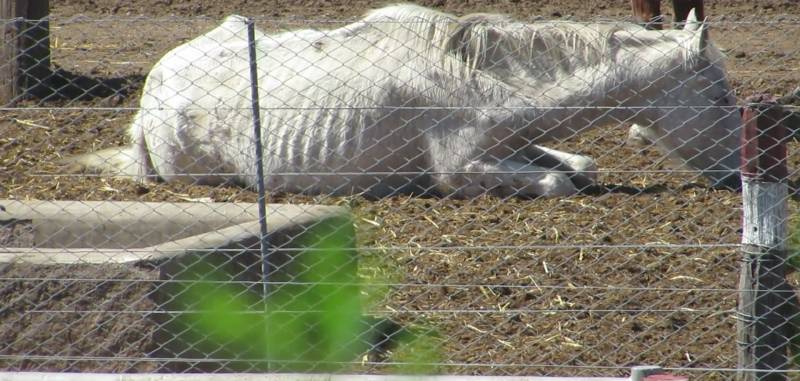
The current timid awareness campaign concerning horse meat consumed in prepared meals is an opportunity to once again shine the spotlight on the unspeakable breeding conditions of horses destined for slaughter.
But as a preamble, let's start with the paradox put forward by the Welfarm association. Did you know ? : "France has the 2nd largest horse herd in Europe, it exports its slaughter horses by the thousands to Japan, and the horse meat consumed in France comes mostly from abroad!"
Exactly, the foreigner, let's go. The Welfarm association brings us to South America, and more precisely to Argentina. This country is home to what the association calls "fields of horror" in which horses undergo the worst treatment before being slaughtered. This situation is not new. Already in 2019 and 2020, the NGOs Tierschutzbund Zürich and Animal Welfare Foundation (AWF) had alerted by means of videos with terrifying images. You could see corpses piled up, starving beasts dying on the ground suffering from untreated wounds.
The associations, which have fought for years to stop such practices, intend to denounce a whole system and its opacity. Indeed, most of the time, it is about stolen horses, racehorses which no longer serve or animals which are the subject of a traffic as dubious as it is lucrative.
The meat of equines is then exported mainly to the European Union. Welfarm also warns about injections into meat of medicinal substances banned in France such as phenylbutazone, and which will end up on the shelves of our supermarkets.
Horse meat is imported from Belgium. Considered as a real hub, this country imports and then re-exports. It leads the way with 1,828 tonnes of meat exported to France, followed by Argentina with 1,073 tonnes and finally Uruguay with 1,823 tonnes per year.
Argentina is not the country in the crosshairs of animal rights activists. Uruguay, Canada and Australia are also among the countries in which horses undergo real torments.
In Australia specifically, whistleblowers filmed in the Meramist slaughterhouse, the only one to export to the EU, "horses arriving already dead at the slaughterhouse, dragged by a rope out of a truck." According to our sources, on other images shot a few months earlier in this same establishment, we could see violence inflicted on horses: "beatings with a stick, electric shocks on the genitals as well as dizziness that was missed and repeated over and over again. leading to the killing of still conscious animals ”.
To cope with the numerous attacks by associations, industry manufacturers have created a label certifying that no mistreatment is inflicted on animals. The “ Repectful life ” label is coordinated by the Belgian Meat Federation (Febev) and “The participants are precisely the slaughterhouses of Lamar, Land-L (Argentina), Bouvry (Canada), Clay Meramist (Australia), it is that is to say the slaughterhouses where the NGOs TSB and AWF have filmed the worst horrors for eight years ” , explains Adeline Colonat, project director at Welfarm.
The same Febev had accepted that surprise checks be carried out in the slaughterhouses, but here again, Adeline Colonat regrets that the establishments checked have been notified! As evidenced by the various checks carried out in 2019 in the Land L slaughterhouse near Buenos Aires, which is regarded as exemplary by showing horses that are well fed and in good health. But Adeline Colonat reminds us that "it is here, in 2020, that two horses lying on the ground, bruised, bloody, agonizing the whole night were filmed"
In France, associations are asking major retailers to give up these imports and Brussels to ban them. However, although acknowledging the problems, Stella Kyriakides, the European Commissioner for Health and Consumer Protection, refuses to ban the importation of horse meat from Argentina.
On their shores, some major retailers have declared themselves ready to stop distributing horse meat outside the European Union (and outside Belgium!) By 2022. A representative of the Système U sign explains: “We are doing it. done for animal welfare reasons, in particular thanks to alerts from NGOs such as Welfarm or L214. But in the same way that eggs from caged hens were brought out, this is not something that can be done overnight. You cannot sever relations with suppliers in a brutal and unilateral manner. "
Let us end this painful article by recalling that the horse meat market in France is very narrow, barely 9% and constantly decreasing, but that it is sufficient to generate a sum of terrible and humanly unacceptable suffering.
As Adeline Colonat recalls "The horse meat produced in these 4 countries (Argentina, Uruguay, Canada, Australia) is an eyesore".
So why not decide on our own to put an end to it?
Posted on 2021-04-17 20:01








Comments